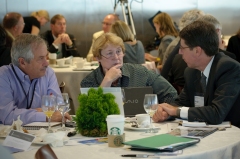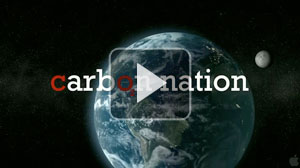By Steve Muzzy, Senior Associate, Second Nature
(This article appears in the July, 2011 issue of The ACUPCC Implementer)
Download the 2011 Climate Leadership Summary Highlights PDF
The 5th Annual American College & University Presidents’ Climate Commitment (ACUPCC) Climate Leadership Summit took place June 23-24 in Washington, DC at The George Washington University. The campus venue was a great success, and signatory institutions will host all Summits in the future. Presidents, provosts, and business officers, mark your calendars: American University will host the 2012 Summit June 21-22, 2012.
Keynote Speaker

Frank Sesno delivering his keynote speech at the 2011 Summit
Frank Sesno, Director of the School of Media and Public Affairs at The George Washington University and host and creator ofPlanet Forward, delivered theopening keynote address (video) – focusing on media and the power of communication. Mr. Sesno’s experience with traditional media has revealed that it is excellent at covering a crisis or an event but is failing to cover complex issues and hold attention over long periods of time. He strongly feels that climate change and the solutions to solve it are compelling, and urged the participants to tell their stories. The ACUPCC network has hundreds of stories to tell about what is happening on individual campuses, how it is strengthening relationships with local communities, and building wider regional efforts. Working to solve climate change is a story worth telling.
Climate Leadership Awards
Following Mr. Sesno, Second Nature presented the Second Annual Climate Leadership Awards, recognizing outstanding examples of ACUPCC signatories that are shifting behavior on campus and within communities to make a low-carbon economy possible. Awards were issued to the following ACUPCC signatories:
- Bunker Hill Community College, Montgomery County Community College, and Mount Wachusett Community College in the Associate College category
- Colgate University and Green Mountain College in the Baccalaureate category
- Delaware State University and Frostburg State University in the Master’s category
- The University of California, Irvine, the University of Maine, and theUniversity of Maryland College Park in the Doctorate Granting category
Congratulations to all of the recipients! Climate Leadership Award recipients were selected by Second Nature Board Members not affiliated with ACUPCC Signatory institutions and were presented with an ecologically-friendly award made from reclaimed fence posts.

The Second Nature Climate Leadership Award winners
Carbon Nation
The evening closed with a trailer from a new film titled“Carbon Nation”.
Day Two
Day two began with a presentation from Paul Anastas, Assistant Administrator for the Office of Research and Development and Science Advisor, U.S. Environmental Protection Agency. Dr. Anastas — known as the “Father of Green Chemistry” — told participants that America’s economic growth will depend on its innovation capacity and that higher education has the infrastructure and expertise to drive innovation by linking operational practice with educational experiences. Dr. Anastas shared the EPA’s P3 – People, Prosperity, and the Planet—Program as a terrific example of how college and university students are using hands-on experience to design solutions for a sustainable future.

Paul Anastas speaking at the 2011 ACUPCC Climate Leadership Summit
ACUPCC Status Update
Mitch Thomashow, former President of Unity College and Co-Chair of the ACUPCC Steering Committee, then provided a status update on the ACUPCC initiative. His presentation underscored the need for higher education to lead society toward sustainability, and the fact that through the ACUPCC, higher education is the only sector with a critical mass committed to climate neutrality. Dr. Thomashow highlighted some key statistics that demonstrate progress the ACUPCC has made: 667 signatories, 6 million students, 400 climate action plans, 478 green building policies, 526 ENERGY STAR policies, an estimated average of 1,000-ton emissions reductions per institution per year, and much more. Finally, he presented a framework of nine elements of a sustainable campus as a practical way taking a comprehensive approach to sustainability in higher education.
National Policy Update
Jim Elder, founder of the Campaign for Environmental Literacy, followed with a national policy update on sustainability and climate change education funding. Dr. Elder reported that the University Sustainability Program (USP) had received $4M as an invitational priority of the FIPSE Comprehensive Program in FY10, but was canceled for FY11. The Campaign for Environmental Literacy has requested that the Department of Education make it again part of FIPSE if funded in FY12.
NSF’s Science, Engineering, and Education for Sustainability (SEES) program including Climate Change Education (CCE) received $660M, including $10M for CCE in FY10. For FY11 SEES funding is unknown – and no new CCE awards were granted this year. NSF has requested $998M for FY12.
NASA’s Global Climate Change Education program received $10M in FY10. For FY11 it has been embedded in NASA’s Minority University Research and Education Program with $7.2M granted. The funding for this program in FY12 is unknown. Contact Jim Elder if you would like to learn how to best support climate change and sustainability policy.
Working Sessions
 Following the morning keynote and program updates, the participants jumped into the day’s working sessions, which were organized around the ACUPCC committees of Academics, Adaptation,Financing, and International Engagement. Scott Miller, President of Bethany College, facilitated the first working session focused on financing sustainability with David McInally, Executive Vice President and Treasurer at Allegheny College and Amir Mohammadi, Vice President for Finance and Administration at Delaware State University. Each shared how their respective institutions have creatively financed sustainability projects. One commonality between them was that sustainability has become key to their institution’s mission and thus has become a part of the operational budget.
Following the morning keynote and program updates, the participants jumped into the day’s working sessions, which were organized around the ACUPCC committees of Academics, Adaptation,Financing, and International Engagement. Scott Miller, President of Bethany College, facilitated the first working session focused on financing sustainability with David McInally, Executive Vice President and Treasurer at Allegheny College and Amir Mohammadi, Vice President for Finance and Administration at Delaware State University. Each shared how their respective institutions have creatively financed sustainability projects. One commonality between them was that sustainability has become key to their institution’s mission and thus has become a part of the operational budget.
Participants then broke into small groups and shared strategies for financing sustainability work on their campuses, and identified what additional information they need and what the ACUPCC network could do to assist schools in these efforts.
Results from the session will inform further development of the ACUPCC’s Financing Sustainability resources.
In the second working session participants were asked to self-select into one of the three remaining topics of Academics, Adaptation, or International Impact of the ACUPCC. The Academic working group was facilitated by Paul Rowland, Executive Director of AASHE. Participants were asked to capture 2-3 concrete outcomes, ideas, or recommendations to provide to the Academic Committee related to (1) effective practices for ensuring that issues of climate and sustainability are a part of the educational experience of all students; (2) the major barriers presidents and senior administrators face in promoting comprehensive education on climate change and sustainability; and (3) the kinds of resources and support that AASHE and Second Nature could provide signatories to assist in fulfilling the academic component of the Commitment during the next year.
 The Adaptation working group was facilitated by Jim Buizer, Science Policy Advisor to the President and Executive Director for Strategic Institutional Advancement at Arizona State University. This discussion focused on the role of the ACUPCC and higher education in adapting to the impacts of climate disruption. Mitch Thomashow, President of Unity College, facilitated the International working group. Participants discussed the role of the ACUPCC and higher education in developing a global climate action movement. The working sessions provided practical results that will be synthesized and available to summit participants shortly.
The Adaptation working group was facilitated by Jim Buizer, Science Policy Advisor to the President and Executive Director for Strategic Institutional Advancement at Arizona State University. This discussion focused on the role of the ACUPCC and higher education in adapting to the impacts of climate disruption. Mitch Thomashow, President of Unity College, facilitated the International working group. Participants discussed the role of the ACUPCC and higher education in developing a global climate action movement. The working sessions provided practical results that will be synthesized and available to summit participants shortly.
Roundtable Discussion
The summit closed with an engaging roundtable discussion focused on Higher Education, Business and Government Collaboration for Sustainability. Beverly Daniel Tatum, President of Spelman College, moderated the panel that included Bill Moses, Program Director of Education, The Kresge Foundation; Maria Vargas, Senior Program Manager, Energy Efficiency Programs, US Department of Energy; and Arlin Wasserman, Vice President of Sustainability and Corporate Social Responsibility atSodexo.
Much of the discussion focused on developing students and leaders that can address and solve the impending global issues that are the result of a fossil fuel based economy. Some ideas included providing a basic science understanding around climate and including real world learning opportunities within curriculum, along with developing resilient thinkers and leaders that can approach and lead during a crisis that society has never before faced. Organizations need to begin to ask if and how their core business activities contribute to climate change.
Final Note
We would like to offer special thanks to The George Washington University for hosting the Summit and to Sodexo, a Diamond sponsor of the ACUPCC, for also providing all of the meals for the event. We would also like to thank all the participants for making this year’s Summit productive and successful – and we look forward to supporting your continued efforts toward carbon neutrality!


Add new comment